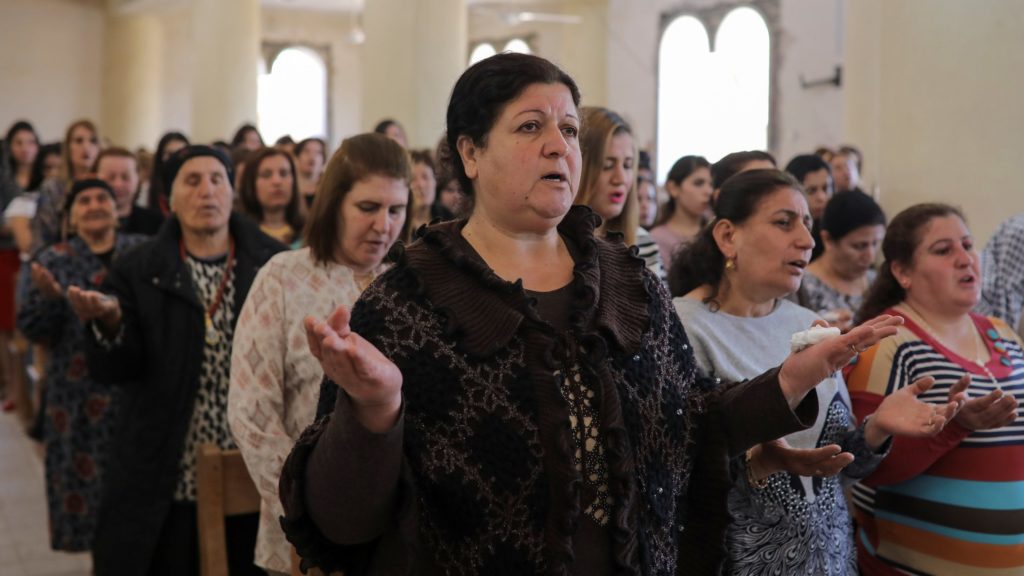The Iraqi Catholic community feels unsettled after Iran launched ballistic missiles, striking upscale neighborhoods of Irbil, the capital of Iraqi Kurdistan, signaling the latest spate of violence targeting northern Iraq.
Iran's powerful Islamic Revolutionary Guard Corps claimed it targeted a spy base for Israel's intelligence agency, Mossad, close to the U.S. consulate in Iraq Jan. 15, a charge refuted by both the region's prime minister and the United States.
The strikes killed four, including Kurdish real estate tycoon Peshraw Dizayi and Christian businessman Karam Mikhail, owner of Al-Rayyan Iraq Group, who attended a social gathering at Dizayi's home.
Pope Francis wrote on X, formerly Twitter, on Jan. 17: "I express my closeness and solidarity with the victims, all civilians, of the missile attack that hit Erbil, in Iraqi Kurdistan. I urge everyone to avoid any steps that might escalate tension in the Middle East and other war-torn areas."
On Jan. 17, Iraqi Kurdish Prime Minister Masrour Barzani canceled a meeting with Iran's foreign minister at the World Economic Forum at Davos in Switzerland in protest over Iranian missile strikes on the Iraqi Kurdish city of Irbil, a source told Reuters.
Barzani earlier called the attacks "unjustifiable and cowardly," urging "the Baghdad government to adopt a firm position against this violation of Iraqi sovereignty." Barzani also called on "our partners within the international community to put an end to these brutal attacks."
The U.S. condemned the action, with State Department spokesperson Matthew Miller describing it as "Iran's reckless missile strikes."
Chaldean Catholic Archbishop Yousif Thomas Mirkis of Kirkuk and Sulaimaniya told OSV News that the entire Middle East region "is like a volcano," with the expectation that anything can happen at this time.
This, he said, was a consequence of the ongoing war in Gaza between Israel and Hamas, troubles in Syria and Lebanon, and the targeting of commercial shipping in the Red Sea by Yemen's Iran-backed Houthi rebels, now under fire by the U.S. and Britain.
Archbishop Mirkis pointed to several distressing incidents also affecting Christians, considered injustices caused by the government in Baghdad against the dwindling community.
Baghdad has still not reinstated the title of Chaldean patriarch to Iraq's Chaldean Catholic Cardinal Louis Sako. Iraqi President Abdul Latif Rashid revoked his title July 3, 2023, and this usurped the clergyman's position both as the officially recognized head of Iraq's Catholic Chaldean Church as well of his position and powers to administer the Chaldean religious endowments, including church properties.
Cardinal Sako left Baghdad at the time and remains in Irbil "in protest over the decree."
Both the cardinal and media in Iraq say the action was likely instigated by Rayan al-Kildani, a leader of a nominally Chaldean Catholic militia in Iraq, the Babylon Brigades, closely tied to Iran. Its political wing holds four seats in parliament reserved for Christian candidates.
"We still don't know what's happening," Archbishop Mirkis said, regarding Cardinal Sako. But he pointed to the Christian seats taken by al-Kildani's Babylon Brigades, despite the fact that al-Kildani was sanctioned in 2019 by the U.S. Treasury Department for alleged human rights abuses. Critics accuse al-Kildani of seeking control of Chaldean Church assets, which Cardinal Sako oversees.
"The Christian quota is taken by a militia that's supposed to be Christian, but is not," Archbishop Mirkis explained. "They want to marginalize the Christian votes, so we feel very weak in this situation," likely because al-Kildani has backing by Baghdad and Iran.
"Although the intention of this allocation is to ensure Christian representation in these provincial councils, Iraqi election law allows anyone, Christian or not, to vote for these seats," wrote Yaqoub Beth-Addai, an Iraqi expert on Iraqi militias at The Washington Institute for Near East Policy. "This loophole has enabled Iranian-affiliated parties to hijack the reserved seats by mobilizing mostly Shia (Shiite) Arab voters behind the Babiliyoun (Babylon) Movement."
Archbishop Mirkis said there is a cloud hanging over the Christian community following the tragic wedding hall fire in Qaraqosh in September 2023. This led to a cancellation of Christmas and New Year celebrations out of safety concerns.
"The wedding fire in Qaraqosh killed 132 persons and has created a sense of depression about the future for Christians," he said. "Some 200 families from Qaraqosh left for Amman in the hopes of emigrating abroad."
Iraqi church leaders expressed their concerns to Baghdad in an official statement on Nov. 28, 2023. "All we fear now is that the state will continue not to take serious action to preserve the rights of Christians, provide them with justice, and return their usurped property … but no one responds to our request," they said.
"There is division inside every community," Archbishop Mirkis observed. "The Kurds are divided, the Arabs likewise. Some Shiites are with Iran, others are not. There are even Christians now that say what will we lose if we go with Rayyan al-Kildani? The challenge of unity, being strong together, this is one of the signs of our time."
Archbishop Mirkis said this is particularly poignant as the church dedicates Jan. 18-25 as the Week of Prayer for Christian Unity. "When I invite people to pray together for unity, they smile and say what for? Even Chaldeans are divided." He expressed a strong need for hope to be restored.

